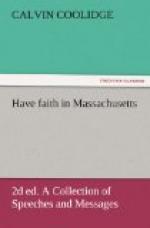For these reasons we have no profession of politics or of public life in the sense that we have a profession of law and medicine and other learned callings. We have men who have spent many years in office, but it would be difficult to find one outside the limitations noted who would refer to that as his business, occupation, or profession.
The inexperienced are prone to hold an erroneous idea of public life and its methods. Not long ago I listened to a joint debate in a prominent preparatory school. Each side took it for granted that public men were influenced only by improper motives and that officials of the government were seeking only their own gain and advantage without regard to the welfare of the people. Such a presumption has no foundation in fact. There are dishonest men in public office. There are quacks, shysters, and charlatans among doctors, lawyers, and clergy, but they are not representative of their professions nor indicative of their methods. Our public men, as a class, are inspired by honorable and patriotic motives, desirous only of a faithful execution of their trust from the executive and legislative branches of the States and Nation down to the executives of our towns, who bear the dignified and significant title of selectmen. Public men must expect criticism and be prepared to endure false charges from their opponents. It is a matter of no great concern to them. But public confidence in government is a matter of great concern. It cannot be maintained in the face of such opinions as I have mentioned. It is necessary to differentiate between partisan assertions and actual conditions. It is necessary to recognize worth as well as to condemn graft. No system of government can stand that lacks public confidence and no progress can be made on the assumption of a false premise. Public administration is honest and sound and public business is transacted on a higher plane than private business.




